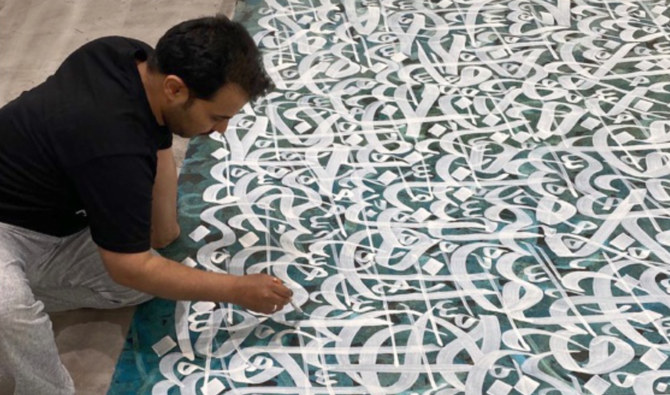MAKKAH: Khaled Mohammed Al-Mutlaq has turned his passion into art in the governorate of Hafr Al-Batin in northeastern Saudi Arabia.
As a child Al-Mutlaq was interested in art and calligraphy, including drawings and fonts.
Al-Mutlaq said: “My parents were the first to encourage me to do that. My passion continued until I joined secondary school in Al-Muftaha Village in the city of Abha. The village was founded for culture, art and heritage, and from there was the actual beginning of developing the hobby through learning more about art schools there and attending workshops.”
There were many visual artists in the iconic village and Al-Mutlaq participated in several exhibitions held there in the summer for three years.

“After that, the artistic experiments and participation continued. I did not lose sight of my passion for Arabic calligraphy, devoting daily efforts and long hours until I obtained a license in Arabic calligraphy, in its six types, from Arabic calligraphy professor Abbas Al-Baghdadi,” Al-Mutlaq said.
“I started my project of integrating the aesthetics, meaning and form of calligraphy with artworks,” Al-Mutlaq said.
“Arabic calligraphy is characterized by a very high cultural and heritage value and an Arabic depth in which the Holy Quran was revealed. The Arabic calligraphy is distinguished from all other writings by the presence of the long vowel, dots and short sound symbols that made the alphabet an art that moves even when it is static,” he said.
He has participated in many international and local exhibitions, including “Between Civilization and Contemporary” in Al-Muftaha Village in 2000. In 2005 he participated in the Arabic calligraphy exhibition at the King Abdulaziz Public Library, and the “Lamsat Wafaa” (“A Touch of Loyalty”) exhibition in Asir Region in 2017. Most recently, he was part of the miniatures exhibition in Riyadh in 2022.
Al-Mutlaq won first place in the International Falcons Club competition in visual art; he has also held several internal artistic workshops.

He said that the difference between calligraphic painting and visual painting in Arabic calligraphy is that the traditional calligrapher relies on the imitation of letters according to established rules. “So the calligrapher works on the calligraphy painting and its letters in the most complete manner that enables the artist to adjust the rule for letters, their dimensions and their golden proportions of mass, space and balance distribution. This adjustment is preceded by templates, experiences and possibilities because letters have many forms, and the artist needs to use the appropriate ones to complete the work.”
Al-Mutlaq said that the visual calligraphy paintings differ, as color and mass are part of the work. There is also some freedom and space in interconnection, composition and repetition. “Thus, I use Arabic calligraphy with a focus on the details of the aesthetics of the Arabic letter in the visual paintings. As for art collectors, these works are more desirable than classic works. They are also more desirable for connoisseurs.”
He is currently working on his first solo exhibition.


















